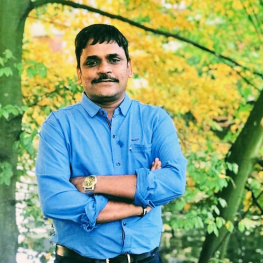
Asheesh Kumar Yadav
GET-COFUND MarieS.Curie Fellow at URJC
Integrated Microbial Electrochemical Technology in Constructed Wetlands for low-cost wastewater treatment and recovery of wastewater resources
About the research project «Integrated Microbial Electrochemical Technology in Constructed Wetlands for low-cost wastewater treatment and recovery of wastewater resources»
Research Line: Efficient technologies of treatment and recovery of wastewaters resources
Mentor: Prof. Fernando Martinez Castillejo
Abstract
Constructed wetlands (CWs) are low-cost treatment systems for wastewater treatment. CWs have a large anaerobic zone and a small aerobic zone in their configuration. CWs face challenges like a slow rate of treatment, large land area requirement, and low treatment efficiency for recalcitrant pollutants. Availability of limited or inefficient electron acceptors or donors in CWs is the basic cause for the said challenges. Microbial electrochemical technology (MET) [such as microbial fuel cells (MFC)] generates electricity during microbial oxidation of biodegradable substrate or pollutants of various wastewaters. In MET, oxidation occurs at an anaerobic anode electrode (works as an artificial electron acceptor), and reduction occurs at an aerobic cathode electrode (works as electron donor). Overall, MET needs anaerobic-aerobic situations for their functioning while CWs naturally consist of such situations. Due to such complementary situations, integration MET and CWs are feasible. Through such integration, the drawbacks of CWs can be overcome via artificially installed electron acceptors and electron donors. Apart from electricity generation, the electron donation capabilities of MET can further be utilized for the synthesis of valuable chemicals and conversion reactions without using external energy. This project aims to develop an innovative CW-MET system, capable of generating electricity with enhanced wastewater treatment efficiency at a significantly low cost.
About Asheesh Kumar Yadav
Asheesh did his Ph.D. Degree from Indian Institute Technology Delhi, India and did his postdoctoral studies from Princeton University, Princeton, NJ, USA.
He is associated as Principal Scientist at CSIR-Institute of Minerals and Materials Technology, Bhubaneswar, India. During these working years, he gained a significant amount of experience in the domain of anaerobic processes, biological waste treatment, constructed wetlands, and microbial electrochemical technology-based wastewater treatment systems along with valuable resource recovery from wastewater. He is the pioneer of the constructed wetlands coupled microbial fuel cell (CW- MFC) technology. The CW-MFC is distinctively recognized by MFCs and CWs researchers. His work improves the existing understanding of conductive materials dependent on microbial redox reactions at the fundamental and application level. He got a good number of fellowships/awards like Indo-American Research Professorship (American Society of Microbiology); three times winner of Erasmus Mundus Scholar Awards for teaching and research in universities in Germany, Poland, Sweden; Winner of VLIR scholarships of Belgium; and Nuffic fellowship of the Netherlands. Besides this, he also holds an adjunct faculty position at the University of Tasmania, Australia.






